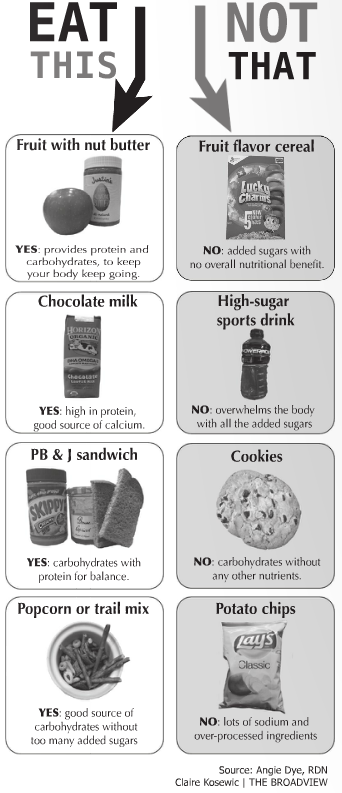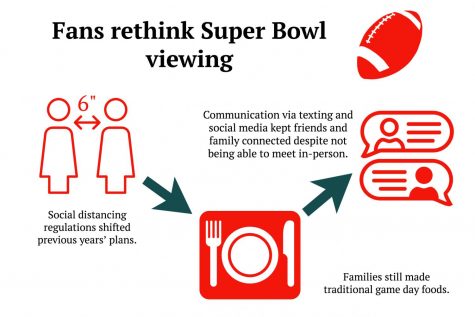Raising the bar on sports nutrition
The diets of teenage athletes are often lacking the foods they need to succeed.
November 5, 2015
Coaches often say that there’s more to succeeding in sports than the hours spent in practice and competition, but teenage athletes commonly overlook what “being healthy” means or how their lifestyle affects athletic abilities.
“Nutrition is not just a sidebar of training and succeeding,” registered dietitian nutritionist Angie Dye said. “It is probably the most essential part of success besides your actual athletic skill.”
Complex carbohydrates, lots of fruits and vegetables, and sources of lean protein are the most important kinds of food athletes need in their diets, according to Dye.
“I know there are certain things I’m supposed to be doing and certain things I’m supposed to be eating,” Ava Jones, who rows crew, said. “I just don’t really know what they are or how I’m supposed to find out about them.”
Active 16-year-old females need an average of 2,500 calories per day, according to Dye. When athletes do not get the nutrition they need to support their rapid growth, their ability to succeed diminishes.
“You are putting a lot of stress on your body, and you need to make sure that you have all the nutrients you need in order to perform,” cross country coach Michael Buckley said. “Each time you workout, your body breaks down a little, and it builds itself back stronger if it has the right materials to do that.”
Almost half of the daily caloric intake of a teenage high-intensity athlete should be from carbohydrates eaten throughout the day, according to Dye.
“The number of times you eat during the day makes a huge difference in athletic performance,” Dye said. “Getting constant energy throughout the day in the form of high power snacks with complex carbohydrates is essential to good health.”
Potato chips and chocolate chip cookies are sources of carbohydrates, but they are not good for sustained energy, according to Dye. Better options are whole-grain rices, pastas and breads.
Lean protein from meat, seafood and dairy products should make up about 15 percent of calorie intake, and fruits and vegetables should take up the other 35 percent, according to the U.S. Department of Agriculture.
“I definitely see in my athletes who has and who has not made good lifestyle choices that day,” Buckley said. “I almost always can tell who has eaten well and who has not, just by how well they perform in practice.”
Although carbohydrates are important, nutrients such as calcium are essential for females to maintain bone density and prevent fractures, according to the National Institutes of Health.
“Most athletes are not getting enough,” Buckley said. “If she is vegetarian or lactose-intolerant, it is even more likely.”
Dairy products, red meat and legumes are all good ways to get the recommended daily 1500 mg of calcium for female athletes ages 9-18.
“Practicing a high-intensity sport that puts immense physical strain on your body can really break down your bones,” Buckley said. “Making sure that you take care of yourself and replenish your body will help you heal faster, perform better and get stronger.”
Student-athletes participating in sports with time commitments over eight hours of hard activity per week should adjust all elements of their lifestyle to benefit their athletic performance.
“Two of the most important things athletes can do for optimum health and athletic performance are drinking enough water and getting adequate sleep,” Buckley said. “That means two to three full water bottles per day and at least seven to eight hours of sleep.”
Teenagers who do not get enough sleep they are more likely to make decisions about food that correlate negatively with athletic performance, according to a study about the relationship between sleep and nutrition published by the NIH.
“I am constantly reminding my athletes about being what I call a ‘24-hour athlete,’” Buckley said. “Food and lifestyle outside of practice and competition affect everything in practice. Getting proper nutrition is probably one of the best things anyone can do to boost their athletic success.”




















